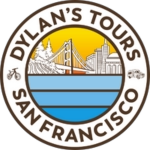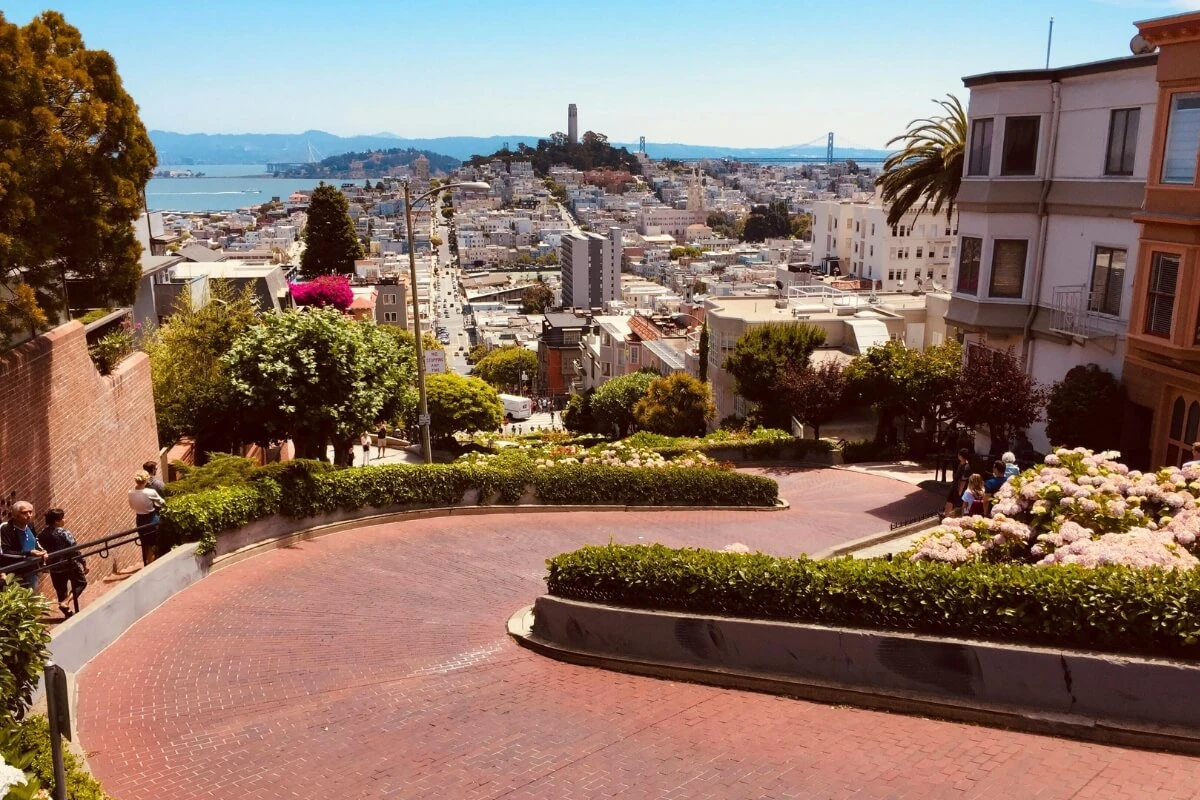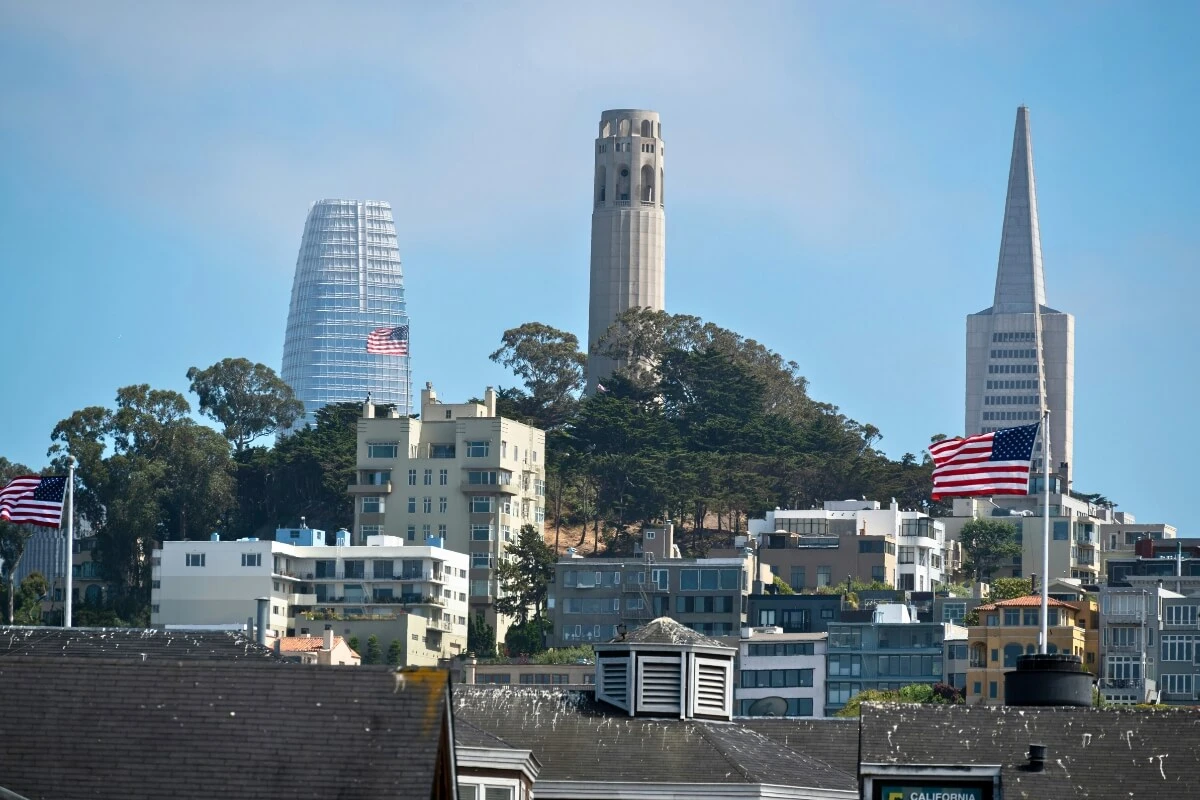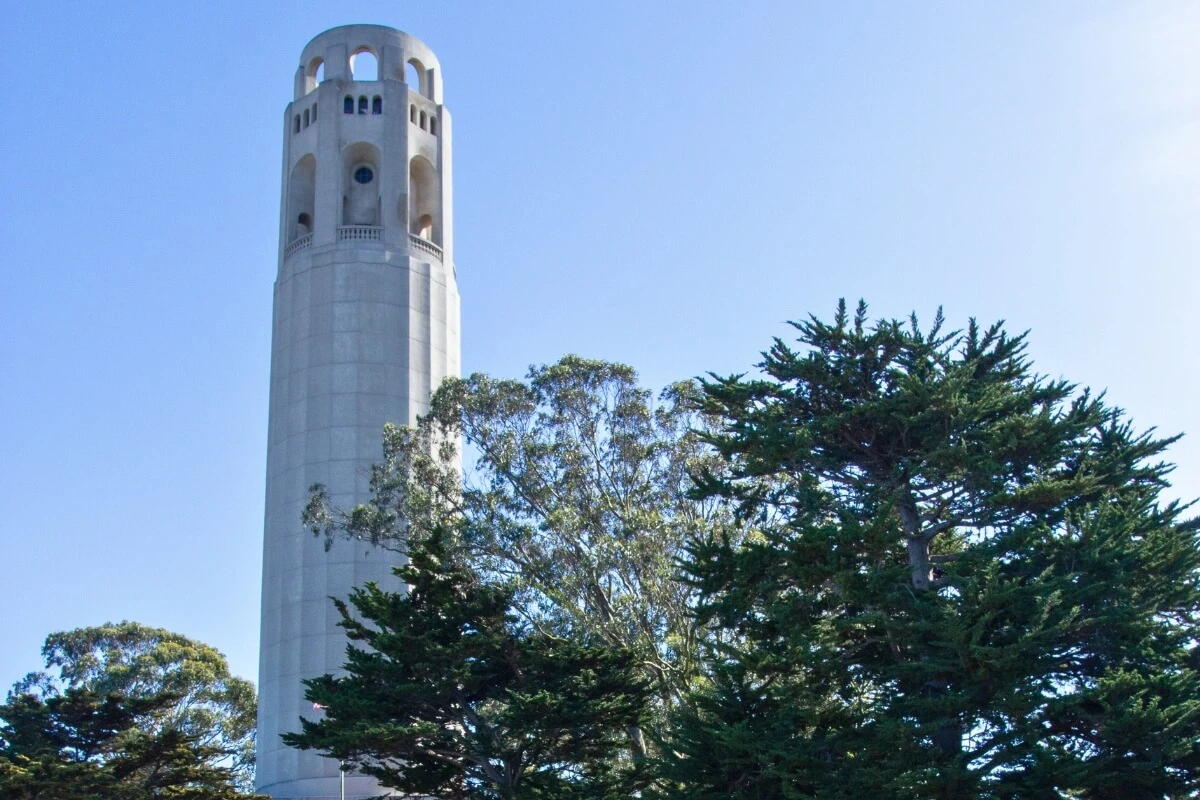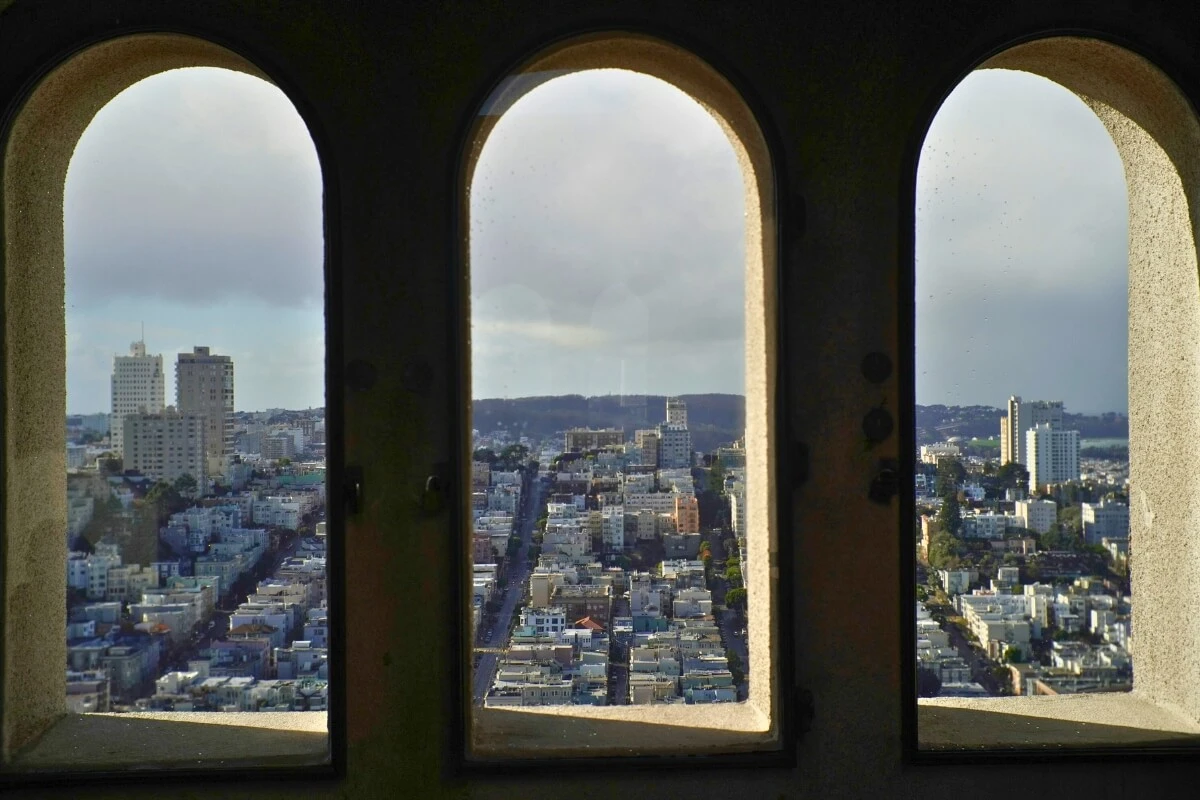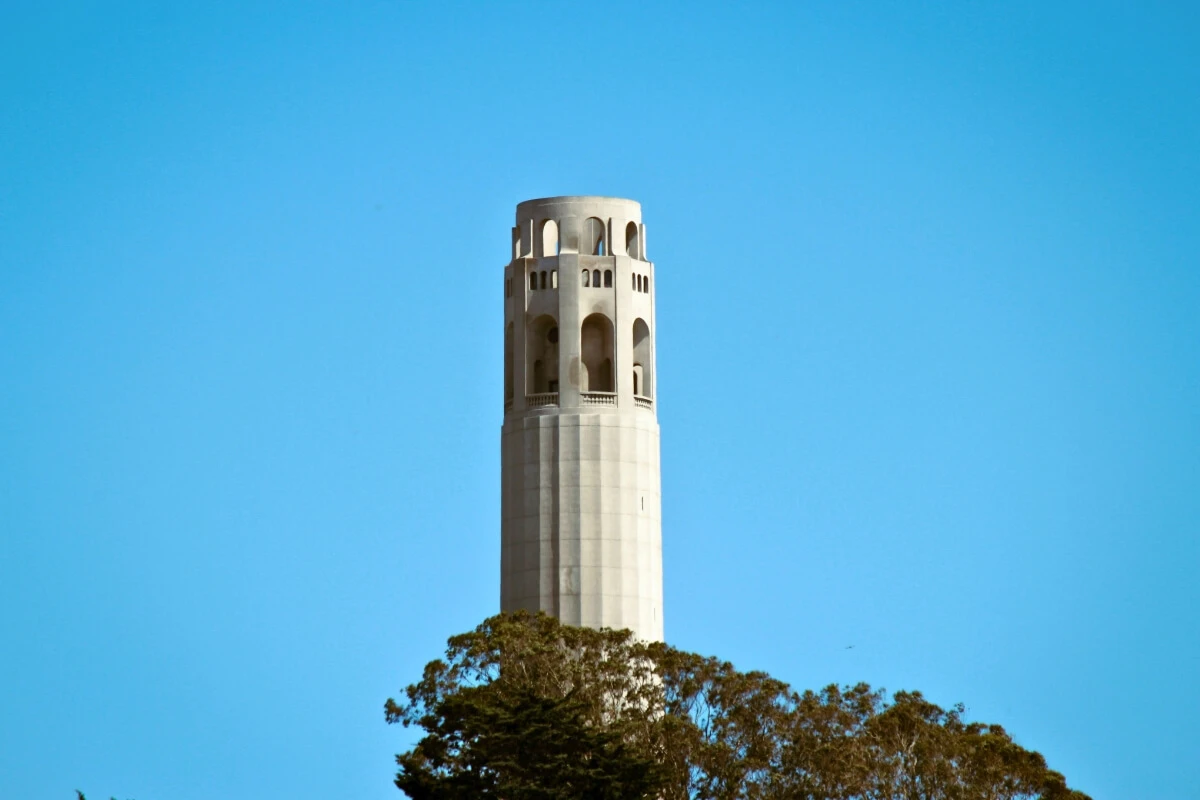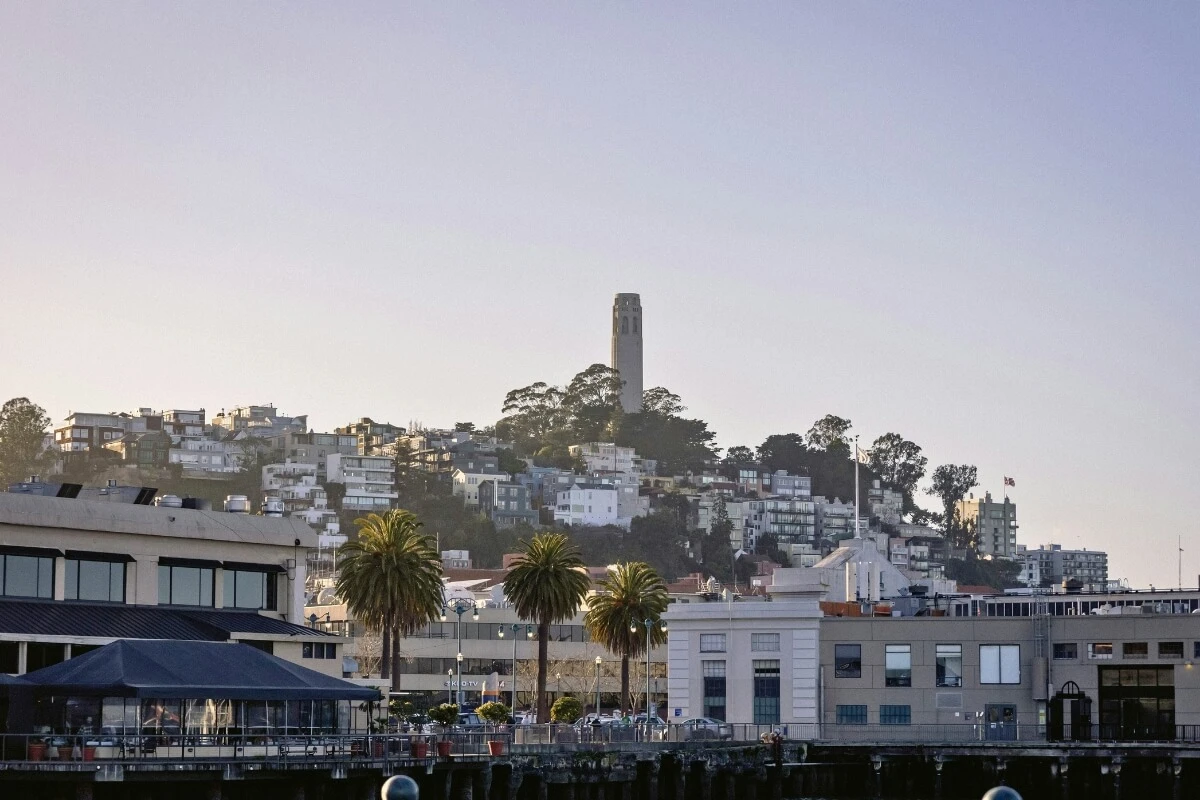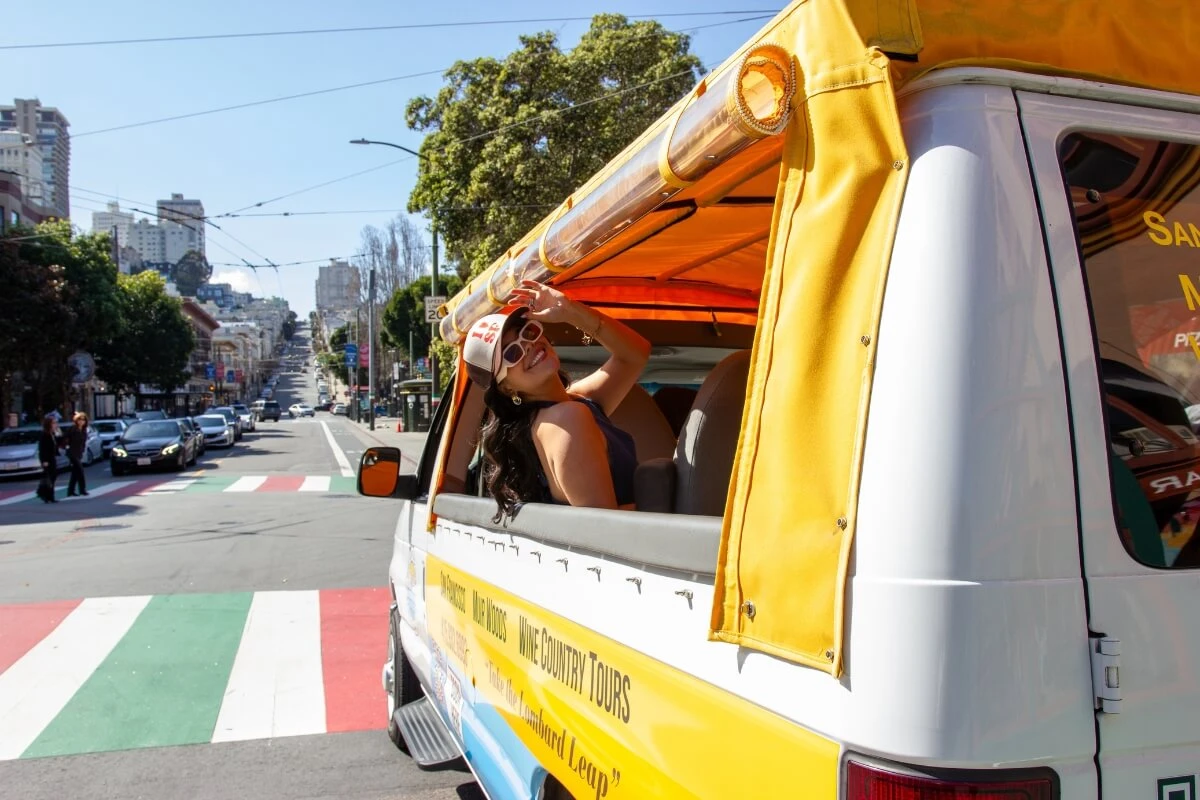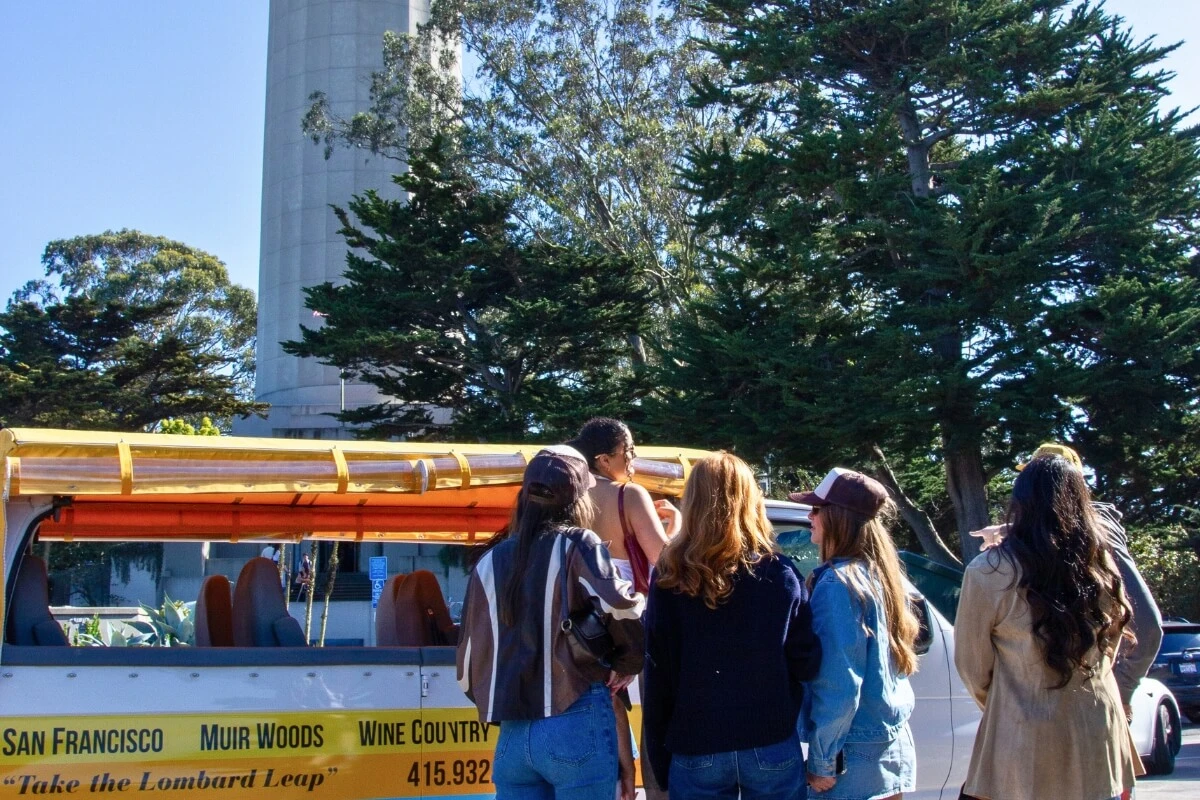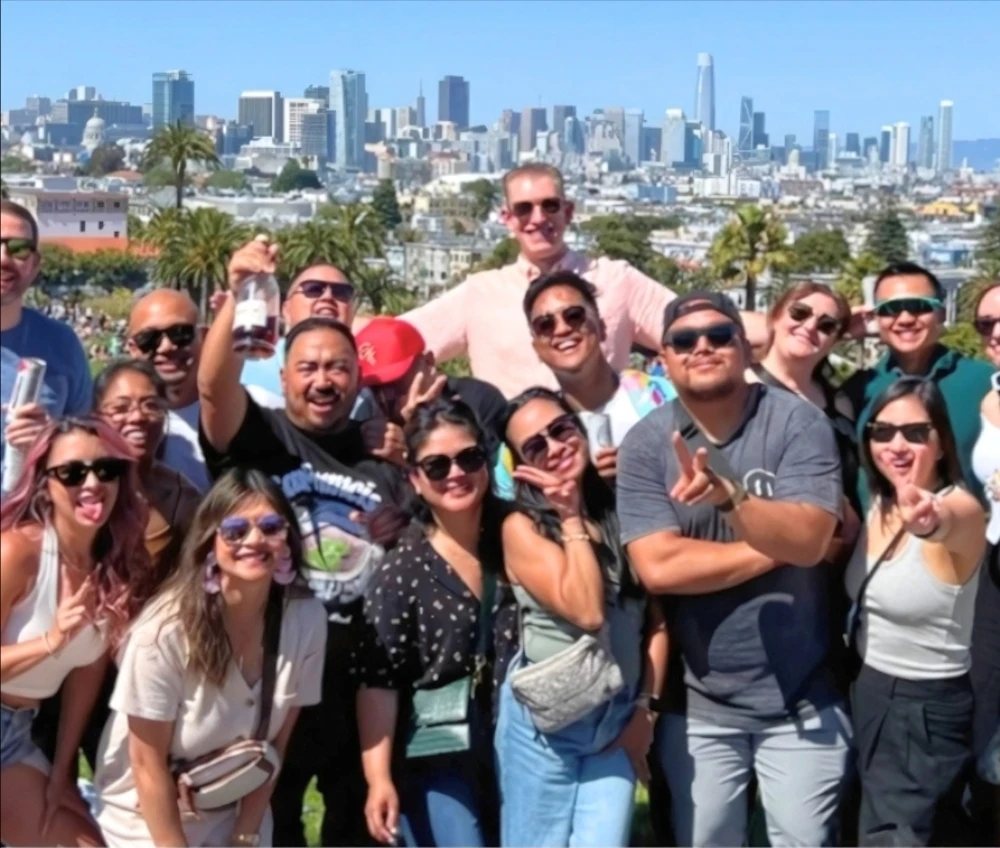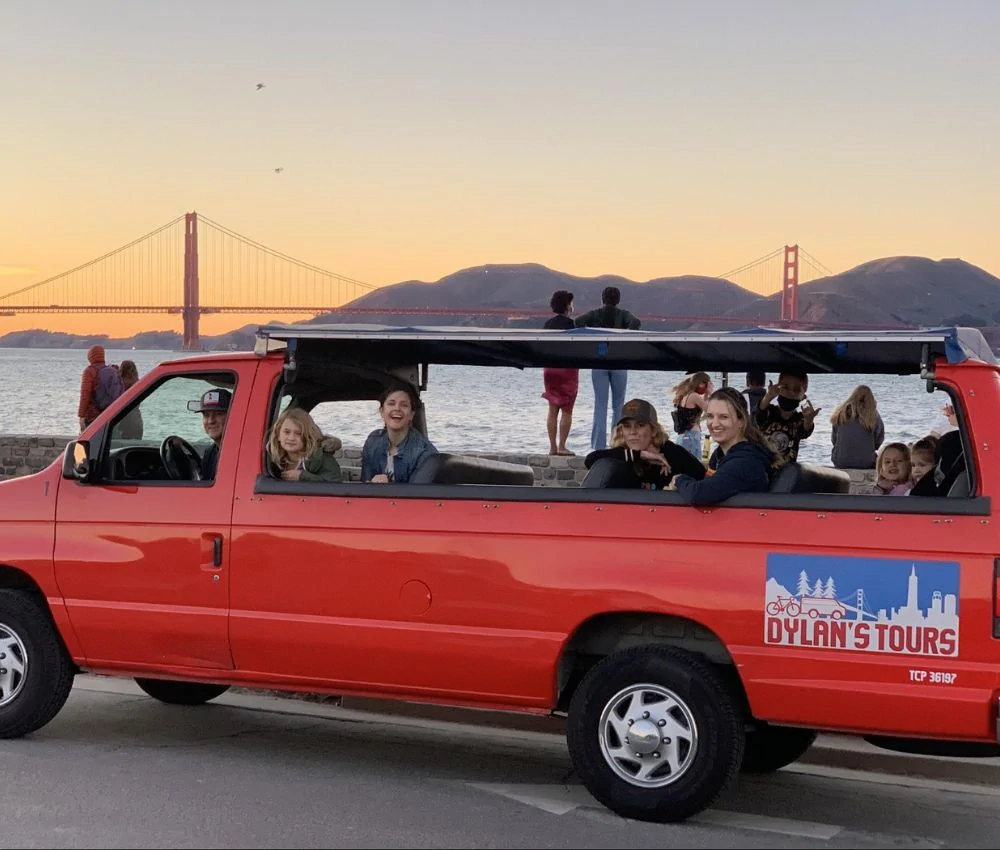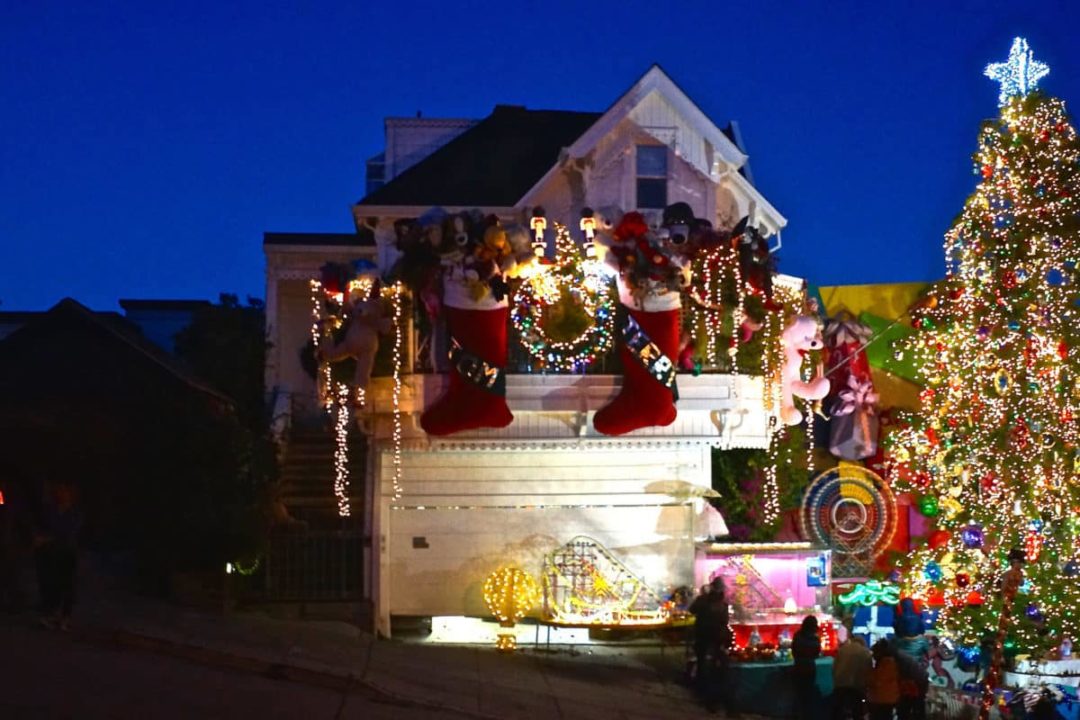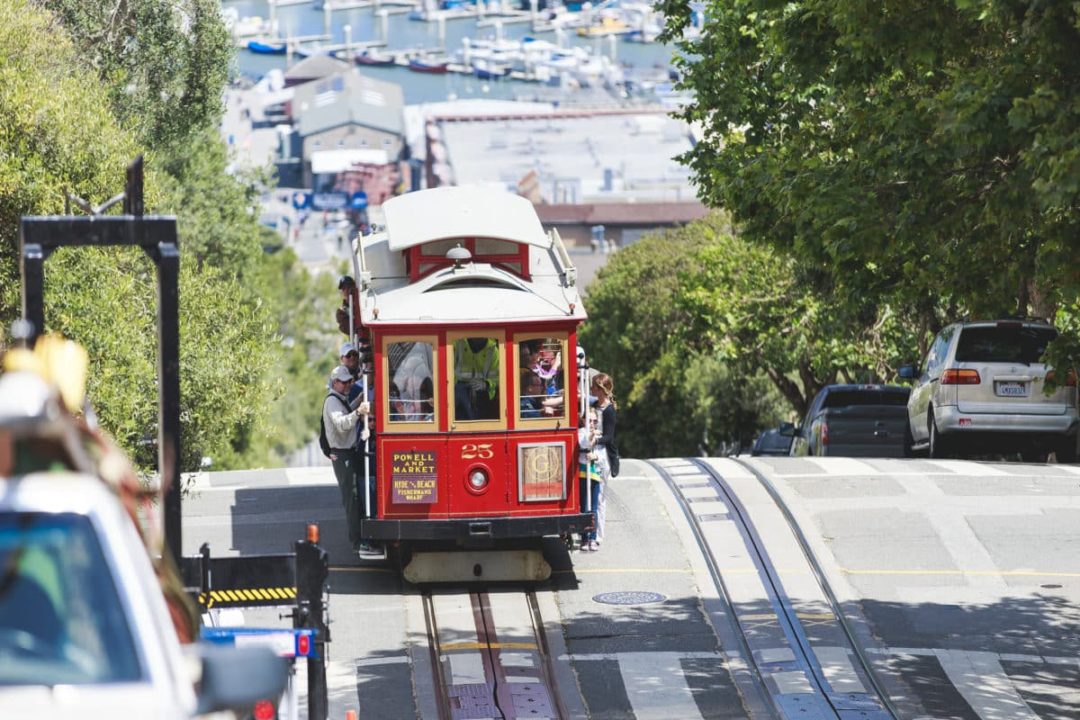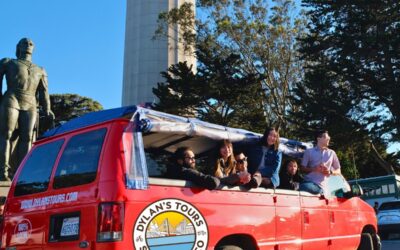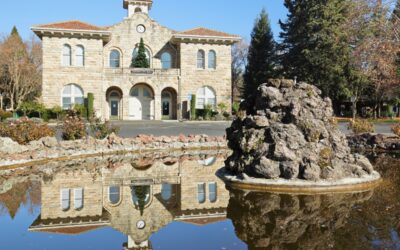Perched above the city on Telegraph Hill, Coit Tower is one of San Francisco’s most recognizable landmarks. Known for its 360-degree views, Depression-era murals, and striking Art Deco design, the tower offers more than just a panoramic photo opportunity. It’s a thoughtful mix of public art, civic history, and quiet escape—all within city limits.
Today, Coit Tower remains a popular stop for travelers exploring the city by foot or as part of a guided experience like Dylan’s Private City Tour. Whether you’re here for the views, the murals, or the neighborhood charm, this guide covers everything you need to know before visiting.
Exploring the Beauty and History of Coit Tower San Francisco
Standing at 210 feet, Coit Tower has been part of San Francisco’s skyline since 1933. Its white concrete column rises above the trees of Pioneer Park, where locals walk their dogs and visitors pause to take in views of the bay. The design is Art Deco with subtle flourishes, built to be both functional and symbolic.
The tower was funded through a bequest by Lillie Hitchcock Coit, a San Francisco socialite and philanthropist who left one-third of her estate to the city. Though it was never explicitly intended to resemble a fire hose nozzle, the structure’s silhouette and its association with the city’s firefighters have made the connection a lasting one.
The History of Coit Tower San Francisco
Lillie Hitchcock Coit and Her Connection to the City
Lillie Hitchcock Coit was known for her unconventional spirit and deep love for San Francisco. In the late 1800s, she became an honorary member of Knickerbocker Engine Company No. 5, one of the city’s volunteer fire units. Her admiration for the fire service and her long-standing civic involvement shaped how she’s remembered today.
When she passed in 1929, she left a generous sum to the city to be used for “adding beauty to San Francisco.” That gift led to the construction of the tower that now bears her name.
Architectural Vision and Design
The tower was designed by Arthur Brown, Jr. and Henry Howard, both prominent architects of the time. Brown also designed San Francisco City Hall. For Coit Tower, the architects drew on clean, vertical lines typical of Art Deco, with a flared crown and minimal ornamentation. The result is a structure that’s both modernist and timeless, built to withstand earthquakes and the passage of time.
Building the Landmark
Construction began in 1932 and was completed the following year. Built atop Telegraph Hill, the tower required careful engineering to manage the site’s elevation and slope. When it opened in 1933, it quickly became a point of pride for the city, offering panoramic views and an open invitation to experience art and public space in a new way.
Exploring the Murals of Coit Tower San Francisco
The WPA and the Mural Project
The murals inside Coit Tower were created as part of the Public Works of Art Project, a forerunner of the WPA. This New Deal-era initiative aimed to provide jobs to artists during the Great Depression, and Coit Tower became one of its most significant sites. Twenty-five artists contributed to the work, many of them students or associates of famed Mexican muralist Diego Rivera.
What the Murals Depict
The murals cover the interior walls of the ground floor, and each one reflects scenes of California life in the 1930s. You’ll see farmers, dockworkers, library patrons, and street scenes—painted with social realism and a sharp eye for class dynamics and labor. The work is striking not only for its technique, but for its unflinching portrayal of the era’s challenges and ideals.
Murals to Look For
Standouts include “Library” by Bernard Zakheim, “City Life” by Lucien Labaudt, and “Industries of California” by Victor Arnautoff. Each piece offers a different perspective on daily life, captured through bold lines, strong colors, and layered symbolism. Together, the murals create one of the most important collections of public art in the city.
Ascending to the Observation Deck
Getting to the Top
To reach the observation deck, visitors can take a historic elevator or climb the tower’s internal staircase. The elevator is the more common route, especially during busy hours or for those with mobility limitations. The stairwell, while narrow and steep, offers its own sense of discovery on the way up.
The View
From the top, you’ll see San Francisco laid out in every direction. North Beach rooftops. The Bay Bridge. The Golden Gate off in the distance. On clear days, the view stretches all the way to Marin and the East Bay. This 360-degree lookout gives you a sense of the city’s shape, its hills and piers, and the blend of natural and built environments that define it.
Landmarks to Spot
Notable sights include Alcatraz Island, the Transamerica Pyramid, Sutro Tower, Angel Island, and both bridges. Many visitors time their visit for the golden hour just before sunset, when the city is bathed in soft light and the photo opportunities speak for themselves.
Capturing Coit Tower: Photography Tips
Best Times for Photography
Sunrise and sunset are the most popular times to photograph Coit Tower, especially when fog is low over the bay. Early mornings tend to be quieter, offering softer light and fewer people. Sunset brings out warm tones and panoramic drama.
Framing and Composition
For striking compositions, frame the tower through trees in Pioneer Park or shoot from below to capture its full height against the sky. From the observation deck, use leading lines—like the streets or shorelines below—to create structure in your shots.
What to Bring
A wide-angle lens helps capture both the tower and its surroundings. A zoom lens is useful for isolating details or reaching distant landmarks. Bring a tripod if you plan to shoot in low light, and consider shooting in RAW for better editing flexibility.
The Legends and Stories of Coit Tower San Francisco
Local Lore and Myths
Over the years, Coit Tower has inspired more than its share of rumors. Some say it was designed to resemble a fire hose nozzle in tribute to Lillie Coit’s connection to the city’s firefighters. Others whisper about underground tunnels or long-lost city secrets buried beneath the hill.
Ghost Stories
There have also been reports of ghostly activity—footsteps with no one nearby, strange echoes late in the day, even the occasional claim of Lillie Coit herself making the rounds. While there’s no proof behind the stories, they’ve become part of the tower’s character.
Separating Fact from Fiction
Most of these legends are exactly that—stories. But like any good landmark, Coit Tower holds a little mystery. And for many visitors, that hint of the unknown is part of the draw.
Planning Your Visit to Coit Tower San Francisco
How to Get There
Coit Tower is accessible by foot, rideshare, or as part of a guided city tour. Walking routes via the Filbert Steps or Greenwich Steps offer some of the most scenic urban hikes in the city, weaving past gardens and hillside homes. If you’re short on time or looking for a more curated experience, Dylan’s Private City Tours includes Coit Tower as one of several thoughtfully chosen stops throughout San Francisco.
Want to learn more about our Open-Air Private City Tours? Hop into one of our open-air vehicles, perfect for families and friends, and explore the city like never before! These private tours for up to 7 people let you cruise to spots big buses can’t reach, making it an unforgettable adventure.
Explore Dylan’s Tours Open-Air Private City Tours here.
Hours and Entry
The tower is typically open daily from mid-morning through early evening. Access to the observation deck requires a small admission fee, which supports ongoing restoration efforts. Hours can vary by season and weather, so it’s best to check ahead.
Visitor Tips
- Arrive early to avoid crowds, especially on weekends.
- Wear good walking shoes—Telegraph Hill is steep, even if you’re dropped off close by.
- Give yourself at least 45 minutes to enjoy the murals and views.
- If you’re touring the city, Coit Tower makes an excellent mid-point to see where you’ve been—and where you’re headed.
Exploring Telegraph Hill and the Surrounding Area
The Neighborhood
Telegraph Hill, the neighborhood surrounding Coit Tower, is a treasure trove of hidden gems waiting to be discovered. As you venture beyond the tower, you’ll encounter a charming labyrinth of hidden stairways, quaint gardens, and historic landmarks.
Take a leisurely stroll through the neighborhood and explore the enchanting Filbert Steps or the scenic Greenwich Steps, each offering unique perspectives and delightful surprises along the way. Discover hidden gardens nestled amidst the urban landscape, providing serene retreats where you can relax and soak in the atmosphere.
Telegraph Hill’s historic landmarks, such as the Saints Peter and Paul Church, add a touch of architectural splendor to the area, further enriching your exploration.
Nearby Spots to Visit
After your visit to Coit Tower, there are plenty of nearby attractions and points of interest to continue your San Francisco adventure. Just a short distance away lies the vibrant neighborhood of North Beach, often referred to as San Francisco’s Little Italy.
Immerse yourself in the lively atmosphere as you explore the bustling streets lined with authentic Italian cafes, gelaterias, and bakeries. Visit Washington Square Park, a gathering place for locals and a great spot for people-watching.
For art enthusiasts, the Beat Museum offers a glimpse into the literary and cultural movement that shaped the city’s history. Additionally, a leisurely walk along the Embarcadero waterfront provides stunning views of the bay, the Bay Bridge, and the iconic Ferry Building.
Wondering what else to do in San Francisco? We’ve put together an epic guide here: 50 Things to Do in San Francisco.
Where to Eat and Wander
As you explore the Telegraph Hill and Coit Tower area, be sure to indulge in the culinary delights and vibrant shopping scene nearby. North Beach is a culinary haven, offering a wide array of dining options. It’s also conveniently where you’ll find Dylan’s Tours Shop!
Savor authentic Italian cuisine at renowned trattorias or try the local seafood specialties at charming seafood restaurants. Don’t forget to sample the delectable pastries and espresso at the neighborhood’s iconic cafes. For those seeking shopping opportunities, Grant Avenue in North Beach is lined with boutique shops offering unique finds, from fashion and accessories to artisanal crafts and books.
Additionally, the area boasts a vibrant nightlife scene, with bars, jazz clubs, and live entertainment venues where you can unwind and immerse yourself in San Francisco’s rich cultural tapestry.
By exploring Telegraph Hill and the surrounding area, you’ll uncover the hidden charms, experience the local culture, and create lasting memories beyond your visit to Coit Tower. So wander through the stairways, discover the local landmarks, and immerse yourself in the vibrant atmosphere that makes this part of San Francisco truly special.
Preserving and Supporting Coit Tower San Francisco
Why It Matters
Coit Tower is more than a scenic stop. It’s a public monument tied to the city’s identity—a place where art, history, and civic memory intersect. Supporting its preservation means supporting the idea that these spaces still matter.
How to Contribute
Revenue from observation deck admissions helps fund maintenance and restoration. Visitors can also donate through the tower’s official preservation partners or participate in educational events that raise awareness of its history and art.
Being a Responsible Visitor
Respect the murals. Follow staff guidance. Leave the space as you found it—or better. Small gestures add up, and each one helps keep Coit Tower accessible for generations to come.
Visit Coit Tower San Francisco with Dylan’s Tours
From its sweeping views to its vivid murals, Coit Tower offers a rare blend of visual beauty and cultural depth. It’s a stop that rewards attention, whether you arrive on foot, by car, or as part of a curated tour.
To get the most out of your visit, consider exploring with a local guide. Dylan’s Private City Tours includes Coit Tower on its route, along with other iconic and lesser-known parts of the city. It’s an easy, informed way to understand how each neighborhood fits into the larger story of San Francisco.
However you arrive, Coit Tower is worth your time. Slow down, look around, and let the city unfold from above.
